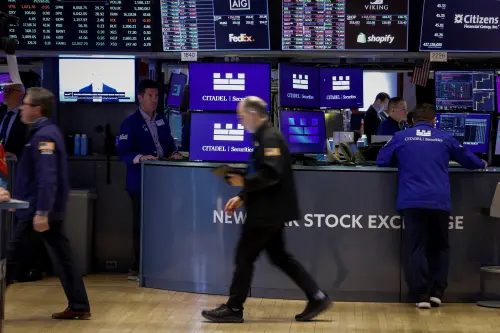March 10 - Morning Brief: U.S.
Key Points in U.S. and Global Markets Today
By [Editor's Name], Editor-At-Large for the Financial Industry and Markets
If the market thought President Trump would ease his unconventional economic plans at the first sign of a slowdown or market turbulence, they might need to rethink. Despite Commerce Secretary Howard Lutnick dismissing the idea of a recession in the U.S., the President himself did not make any predictions and acknowledged that some volatility was inevitable.
Acknowledging the current transition, Trump stated to Fox News, "There is a period of transition because what we're doing is very big. It takes a little time, but I think it should be great for us."
Recent market jitters stem from uncertainties around trade tariffs, government expenditures, and layoffs, eroding confidence among both businesses and consumers. Last week, the S&P 500 fell by 3.1%, Nasdaq by 3.45%, Dow Jones by 2.4%, and Russell 2000 Small Cap index by 3.9%.
" He's not going to step off the gas," Lutnick mentioned on NBC's "Meet the Press," emphasizing Trump's commitment to press on.
U.S. stocks somewhat stabilized following a positive jobs report on Friday and reassurance from Federal Reserve Chair Jerome Powell regarding the economy's current resilience. However, fears persist regarding a weakened job market, with Powell indicating that the Fed plans to maintain its current stance for the foreseeable future.
Stock futures were down on Monday, Treasury yields slipped, and the dollar recovered some of the losses from the previous week. Internationally, Chinese markets reacted negatively to surprising data, and European stocks also saw declines.
In other news, Canada's dollar strengthened as former Bank of Canada and Bank of England governor secured the position of the country's new Prime Minister.
Today, we will examine how dynamic government policies are overshadowing central banks. After an era dominated by monetary policy, investors may now need to seek alternative sources for guidance.
Today's Market Insight
Central Banks Fading into the Background
While central banks have traditionally held a leading role in global markets and economies, they are now assuming supporting roles as governments take center stage.
In a span of just a few months, the Trump administration's disruptive policies have significantly reshaped the global economic landscape, disrupting economic forecasts and investment flows worldwide.
The broad changes introduced by Donald Trump's government and the upheaval of longstanding U.S. alliances have triggered a shift in German and European fiscal policies, prompting China to enhance stimulus efforts to reach its growth target of 5%.
Uncertainty surrounding trade has unsettled U.S. businesses, impacting household confidence and fueling fears of a downturn, as evidenced by recent stock market fluctuations.
As the Federal Reserve grapples with uncertainties, including uncertain predictions for the upcoming week, it struggles to forecast long-term economic trends amid volatile conditions.
Investors are now confronting ambiguity about economic growth, inflation, interest rates, and political risks, as they navigate through a complex economic landscape reshaped by global policy shifts.
The growing influence of fiscal policies in Europe is evident, with the European Central Bank adjusting interest rates and closely monitoring fiscal changes in Germany, which is poised to implement substantial defense and infrastructure spending initiatives.
As investors adapt to evolving economic conditions, central banks are likely to remain cautious in their monetary policy decisions, giving precedence to fiscal directives that are reshaping market dynamics globally.
Market dynamics continue to evolve, with fiscal policies emerging as a dominant force driving investment sentiments, reshaping traditional market influences on economies and currencies worldwide.
